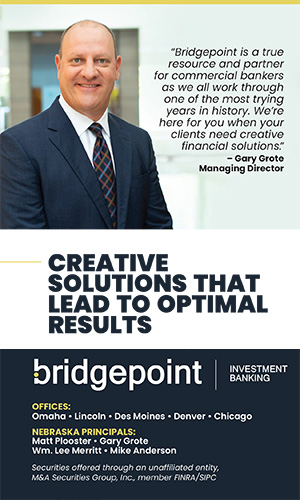Gary Grote, Managing Director, Bridgepoint Investment Banking
Bankers undoubtedly spent the better part of March to May 2020 dealing with stressed, scared and frustrated clients while trying to play mind reader with the SBA. Covid-19 is sure to stress the bank’s loan portfolio as businesses face varying impacts of the health crisis. Larger regional banks likely have a special assets group with bankers trained to deal with these special situations. But even for these bankers (and especially for community bankers tasked with wearing both the business development and special asset manager hats), there may come a time where the bank customer is better served by a specialty lender for a period of time. These specialty lenders are happy to work in partnership with a local bank that continues to provide non-credit services like cash management.
Bridge Financing
A liquidity shortfall, pending debt maturity or overleveraged balance sheet does not indicate a failure of leadership. Situations like this are often caused by industry cycles, changing regulations or shifting markets that, as a result, have a negative impact on an organization’s financial arrangements. Moreover, situations like this do not have to mean bankruptcy or sale. There are forms of financing — referred to as bridge, stress or rescue — that can be leveraged as a solution to the problem. Understand that a special financing situation can surface in any industry during any point in an economic cycle.
Bridge financing is an interim option primarily used to fulfill a company’s short-term working capital needs until a more long-term financial solution can be arranged. This type of loan typically comes with a higher-than-normal interest rate based on investor risk.
Bridge financing is arranged through partnership with an investment bank, which has connections to private debt, institutional capital and alternate source lenders. Additionally, investment banks are able to bring sophisticated systems and deep market knowledge to the table. Think of this type of financing as a bridge that connects a company to capital through short-term borrowings.
Who Provides Bridge Financing?
Bridge financing is available through lenders with substantial amounts of cash who are looking for opportunities to put these funds to work. Here is a list of typical lending sources.
Private Lenders — These are individuals or non-bank companies that are generally considered more aggressive than traditional lenders. Private lenders fund a variety of loans, including those designated as bridge. An advantage is that they tend to have faster approval times than banks due to less regulatory scrutiny.
Family Office Debt Funds — Family offices are privately held wealth management advisory firms that serve individuals and families generally with a net worth skyward of $100 million in investable assets. A primary role of family offices is to seek worthy debt fund investments on behalf of their clients. They often interface with investment banking firms and other outside managers to achieve capital gains for their clients.
Private Debt Funds — Another alternative to traditional banks, private debt funds specialize in raising money from investors and lend it to companies for a variety of purposes including mezzanine financing, distressed financing, growth capital, merger and acquisition and other special situations funds.
Who Qualifies for this Type of Capital?
Forms of bridge financing are not recommended for startup businesses but instead for existing companies that can demonstrate the ability to make it through a temporary downturn. Established companies with good track records and experienced management teams generally can qualify for bridge financing without difficulty. In fact, lenders understand that this sort of capital is needed quickly and for a shorter period time than long-term leveraged debt options.
Bridge financing is meant to alleviate immediate monetary pressures, allowing the company to focus on correcting operational, financial or personnel deficiencies to emerge as a stronger organization and return to traditional financing with a bank.
Gary Grote is a 24-year veteran of Nebraska banking and now a managing director with Bridgepoint Investment Banking. For more information, contact Bridgepoint at 402-817-7940.
Bridgepoint is a boutique investment banking firm that provides sophisticated, flexible and creative solutions to middle market companies, which typically are overlooked by Wall Street. In order to offer securities-related investment banking services discussed herein, and to include M&A and institutional capital raising, certain representatives of Bridgepoint Investment Banking are registered representatives of M&A Securities Group, Inc., an unaffiliated broker-dealer and member of FINRA/SIPC. This entity is not affiliated or associated with, authorized or sponsored by Bridgepoint Advisers Limited.
This story appears in 2020-2021 Issue 1 of the Nebraska Banker Magazine








